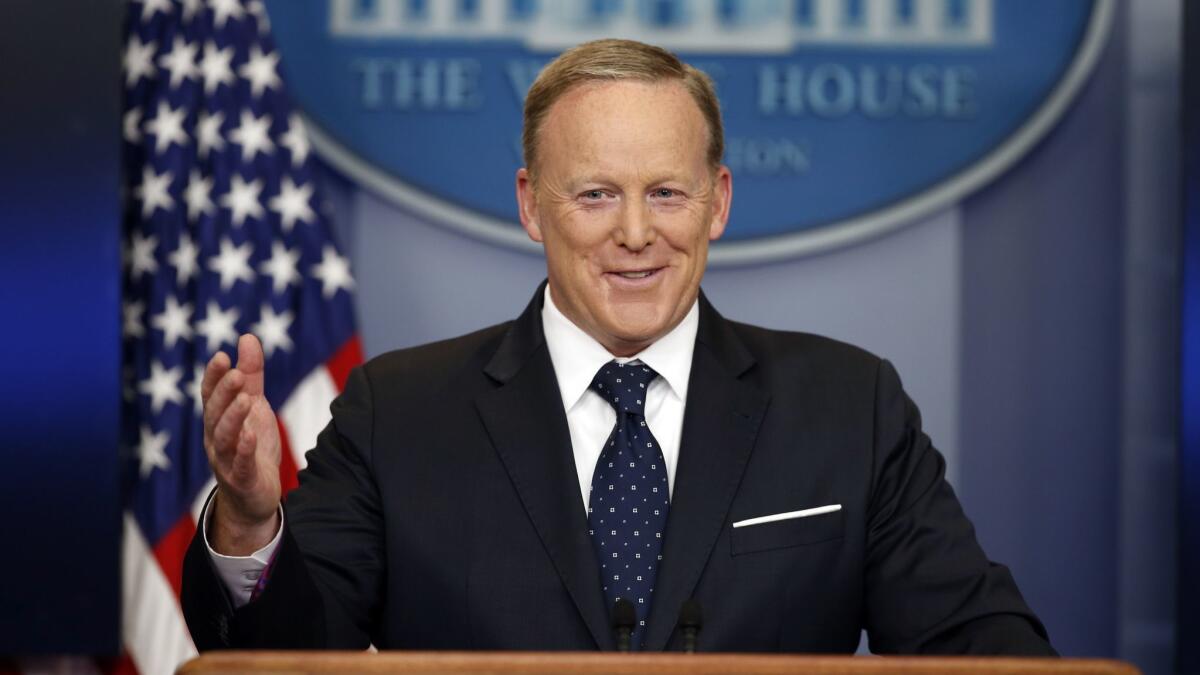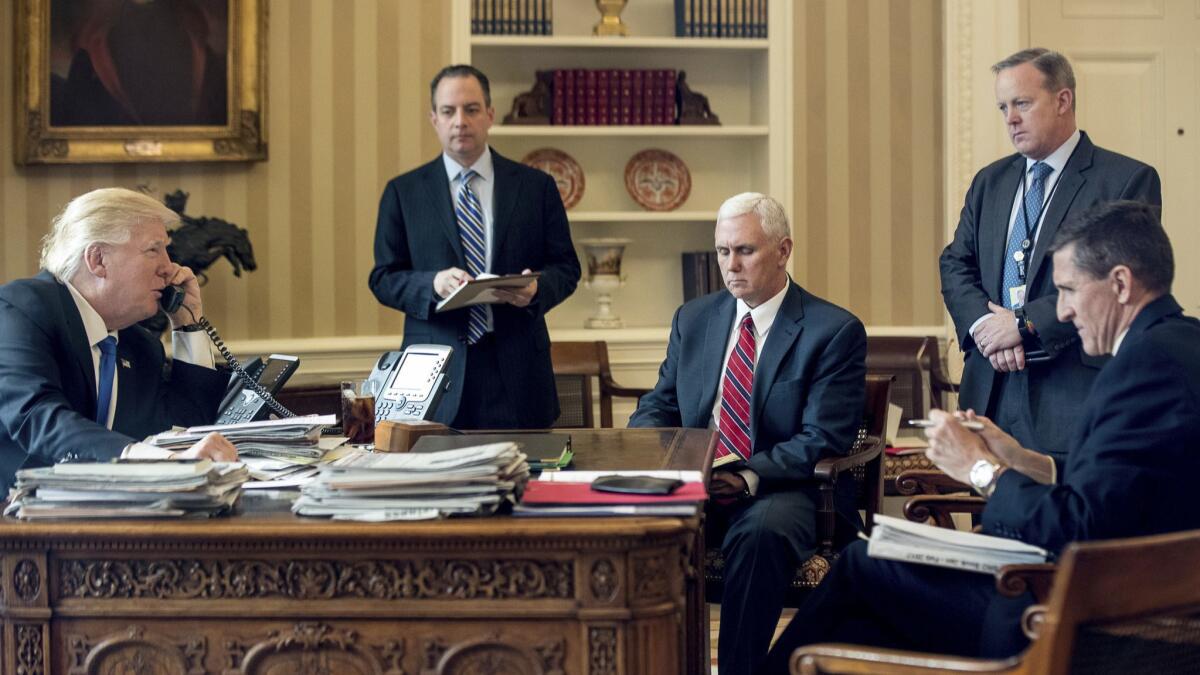Sean Spicer’s book is ‘a bumbling effort at gaslighting Americans’

During his brief, comic stint as White House press secretary, Sean Spicer had a special, up-close view of President Trump. In his memoir, “The Briefing,” he portrays a president who may seem foreign to many Americans. In Spicer’s telling, Trump has a “deep vein of compassion and sympathy.” He is a “man of Christian instincts and feeling.” He is a man who showed his humanity in a phone call after Spicer’s father died. “The sincere compassion and empathy in his voice was something I will never forget,” the former press secretary writes. “I wish more people saw that side of him.”
What many people see is something quite different. Instead of a wonderful, loving man, the American public sees a fellow who boasts of “grabbing” women “by the ...,” a fellow who denigrates the parents of a soldier who was killed by a suicide bomber in Iraq, a fellow who tweeted that MSNBC host Mika Brzezinski was “bleeding badly from a face-lift,” a fellow who presided over family separations at the Southern border, a fellow who ... there is just too much in this category.
Even a half-witted political memoir would grapple with such a disconnect — perhaps by acknowledging some fault in the boss, or perhaps by comparing his low points with those of other presidents. Yet “The Briefing” isn’t a political memoir, nor is it a work of recent history, nor a tell-all, or tell-anything. Rather, it is a bumbling effort at gaslighting Americans into doubting what they have seen with their own eyes as far back as June 2015, when Trump announced his candidacy and labeled Mexican immigrants as rapists, beginning a pattern of racist attacks.
Spicer marches in lockstep with the Trump administration’s now-common practice of maligning the news media. He rummages through the mistakes of major news outlets during the Trump era. The Washington Post, the New York Times, ABC News, CNN and others are criticized for false reports or suspect claims, such as the time Spicer stood accused — falsely, he says — of expropriating a mini-refrigerator from junior staff members. Spicer draws a broad conclusion about the media from an unfortunate incident on Inauguration Day, when Time magazine reporter Zeke Miller tweeted incorrectly that the Oval Office’s bust of the Rev. Martin Luther King Jr. had been removed. Spicer writes, “It reaffirmed the way the media has been transformed: by believing that being first and sensational is better than being right. The problem is that, once tweeted or reported, a breaking story begins the narrative, and no correction ever has as much impact as the initial report, no matter how wrong it is.”
To hear Spicer lecture about errors, one might suppose he’d show some concern about the false and misleading tweets that Trump blasts daily to his 53 million followers. “In the face of these outbursts, the media often expected me to be an ombudsman if not an outright apologist for Donald Trump’s tweets,” writes Spicer, 46. “I never did that. And I consider my stance on this to be a matter of principle.”

On the larger question of Trump’s mendacity ... uh, what mendacity? Twisting language into the incomprehensible — and meaningless — was a special talent of Spicer the press secretary and also clearly of Spicer the memoirist. In discussing the president’s truthfulness, he writes: “If Trump was frank to a fault, openly imprecise in his language, and brashly indulgent of ‘truthful hyperbole’ on his own behalf, many found Hillary [Clinton] to be skirting the truth in ways that were much more serious.” If that passage was hard to track, try this one from Spicer in the White House briefing room; here he was responding to a national security question: “I think that it is interesting, the level of or the lack of interest that I’ve seen in these developments when it goes in one direction versus, where I think it was going, where other, other amounts of interest that have come from this room and beyond.”
Trump’s use of language — often slandering his opponents, for instance, as “Lyin’ Ted,” “Little Marco” or “Crooked Hillary” — doesn’t seem in Spicer’s view to be either coarse or an unfortunate precedent for presidential politics. It was genius. Trump “was a master of branding and psyched out his opponents by defining them with nicknames that stuck,” Spicer writes.
As he embarked on his half-year tenure as press secretary, Spicer floated the controversial idea of moving the briefings to a larger space in the Eisenhower Executive Office Building. Jeff Mason, a Reuters correspondent then serving as the president of the White House Correspondents’ Assn., told Spicer that more room might be needed in the early weeks of the administration but that interest in the briefings would diminish as time went on. Attempting to show what a clever soul he was, particularly in comparison to some know-nothing journalist, Spicer writes: “As the calendar flipped from February to March, and the briefings became ‘must-see TV,’ attracting millions of daily viewers, I would gently remind him of that prediction.”
Spicer’s observation demonstrates a tragicomic lack of self-awareness. Has the former press secretary entirely forgotten his portrayal by Melissa McCarthy on “Saturday Night Live”? His appearances on the briefing podium were “must-see TV,” precisely because they were absurd ineptitude that facilitated McCarthy’s send-ups. Spicer doesn’t offer much personal reflection on McCarthy’s performances. He seems a little confused about how to respond. “I had no choice but to laugh,” he writes. “But there was no denying it was funny.”
In tracing his career, Spicer lays out a classic Washington tale. He secured grunt work as a young professional, he networked, he gave his life to Republican politics, he got a break or two in the campaign field and he ultimately landed at the Republican National Committee working alongside Reince Priebus. When Trump came along, there was Spicer, ready to help. For years and years, in other words, Spicer labored in Republican politics, all for the privilege of working for this boorish president. Did Spicer undergo a period of soul-searching? There’s little sign of it in his book. Trump won, and that was that.
Spicer relives the controversy over the crowd size at Trump’s inauguration. The morning after the ceremony, Trump phoned his press secretary to ask if he’d seen the news. “The president was clear,” Spicer writes. “This needed to be addressed — now.” He held a press event and offered what he thought was a strong statement about the media’s inaccurate reporting on inauguration attendance and then left without taking questions.
“I went back to my office, expecting an ‘attaboy’ from the president; instead, Reince was waiting for me and said the president wasn’t happy at all with how I had performed.”
Silly Spicer — it had escaped him that the president wanted a “polished, nuanced argument defending his position.” The former press secretary blames himself for this oversight. “I started to wonder if my first day would be my last,” he writes. “I had made a bad first impression, and looking back, that was the beginning of the end.”
Wemple, the Washington Post’s media critic, focuses on the cable-news industry. Before joining the Post, he ran a short-lived and much publicized local online news operation, and for eight years served as editor of Washington City Paper.
“The Briefing: Politics, the Press and the President”
Sean Spicer
Regnery: 278 pp., $28.99
More to Read
Sign up for our Book Club newsletter
Get the latest news, events and more from the Los Angeles Times Book Club, and help us get L.A. reading and talking.
You may occasionally receive promotional content from the Los Angeles Times.







